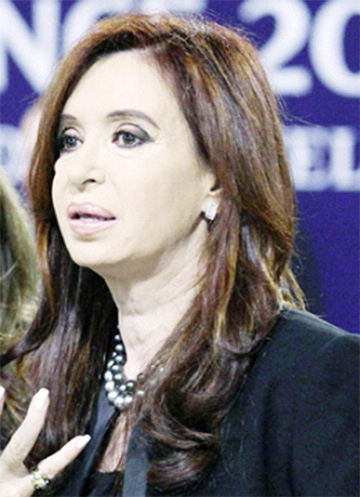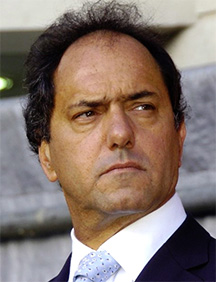Over the past year, I have often said that whoever wins Argentina’s Oct 25 elections, including government candidate Daniel Scioli, will be much better than outgoing President Cristina Fernández. But after interviewing Scioli this week, I’m less optimistic about Argentina’s post-election future.
During the interview from his office in Buenos Aires, Scioli — the current front-runner in the polls — didn’t depart one inch from the Fernández government’s far-fetched narrative claiming that the country is doing great, and doing better every day. In fact, all international indicators show the opposite.
According to the International Monetary Fund (IMF), the World Bank, the United Nations and the world’s biggest private banks, Argentina has — alongside Venezuela — Latin America’s highest inflation rate, and one of the region’s lowest economic growth rates.

But when I mentioned these statistics to Scioli — whom I have known for two decades, and is much more level-headed than outgoing president Fernández — he shrugged them off almost as if they were irrelevant. He countered that Argentina has in recent years reduced unemployment from 25 per cent to 6.5 per cent.
“I don’t agree at all with the perception that Argentina is a country in trouble,” Scioli told me. “We’re going to vote on Oct 25 with an Argentina that is growing, that has reduced unemployment, that has a solid level of foreign reserves, with major activity within our domestic economy.”


When I mentioned that Argentina’s unemployment rate has fallen because the populist governments of Fernández and her late husband Nestor Kirchner have increased the number of government employees by nearly 70 per cent, he didn’t seem to see that as a major problem.
Asked whether he would reduce the number of public employees to reduce public spending and inflation, he responded, “No, not at all.” He proudly added that, as governor of the Buenos Aires province, he has increased the number of police agents, teachers and other public servants.
On foreign affairs, I asked Scioli whether restoring Argentina’s bad relations with the United States would be one of his foreign policy priorities. Seeming to downplay the importance of the world’s biggest economy — in line with outgoing president Fernández anti-American stance — he responded that he plans to work with “all countries in the world that offer opportunities,” including the United States. He emphasized that he expects to improve ties with Bolivia, Paraguay and other neighbouring countries.
On Venezuela’s refusal to accept international observers from the Organization of American States for the crucial Dec 6 legislative elections, he said, “I am not going to interfere with a sovereign issue of the Venezuelan authorities.”
Toward the end of the interview, when I asked Scioli about his critics’ claims that he would be a puppet of Fernández, who has placed her loyalists in key positions around him, Scioli said that he has often been “underestimated” throughout his political career.
“I have always fully exercised my constitutional powers. I have done it in all government jobs I have had, and I will do it as president,” he said.
My opinion: I still think that, if elected, Scioli would be a better president than Fernández, who has squandered an economic bonanza from high world commodity prices with disastrous populist policies and rampant corruption. He is a less polarizing, and more pragmatic figure than the outgoing president, even if his current rhetoric sounds as outdated as hers.
Still, there are reasons to be worried about Argentina, regardless of who wins. If opposition leader Mauricio Macri wins, Argentina would have a more modern-thinking government, but he would most likely not have a majority in congress and may have a difficult time governing.
On the other hand, if Scioli wins, as former Argentine Foreign Minister Dante Caputo wrote in the daily La Nacion, the government-backed candidate would have to choose between ceasing to be a populist, in which case he would have the “Kirchnerista” wing sabotaging his government from within, or continue to be a populist, in which case Argentina would be headed to an even bigger economic and social crisis.
Granted, new coalitions could be formed before the October elections, or before a possible second round in December, that could make a future government more viable. But right now, there are reasons to cry for Argentina.
© The Miami Herald, 2015. Distributed by Tribune Media Services.




